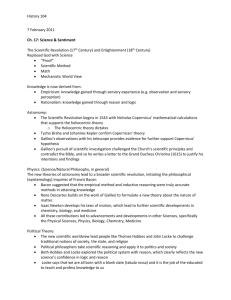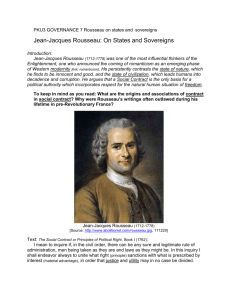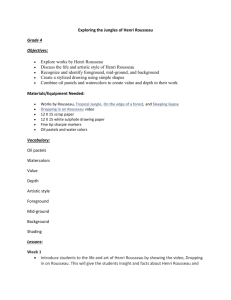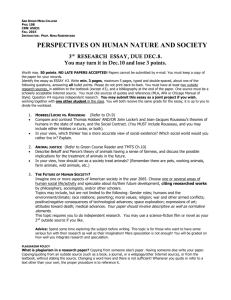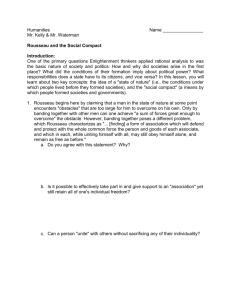Essay II - University of Richmond Blogs
advertisement
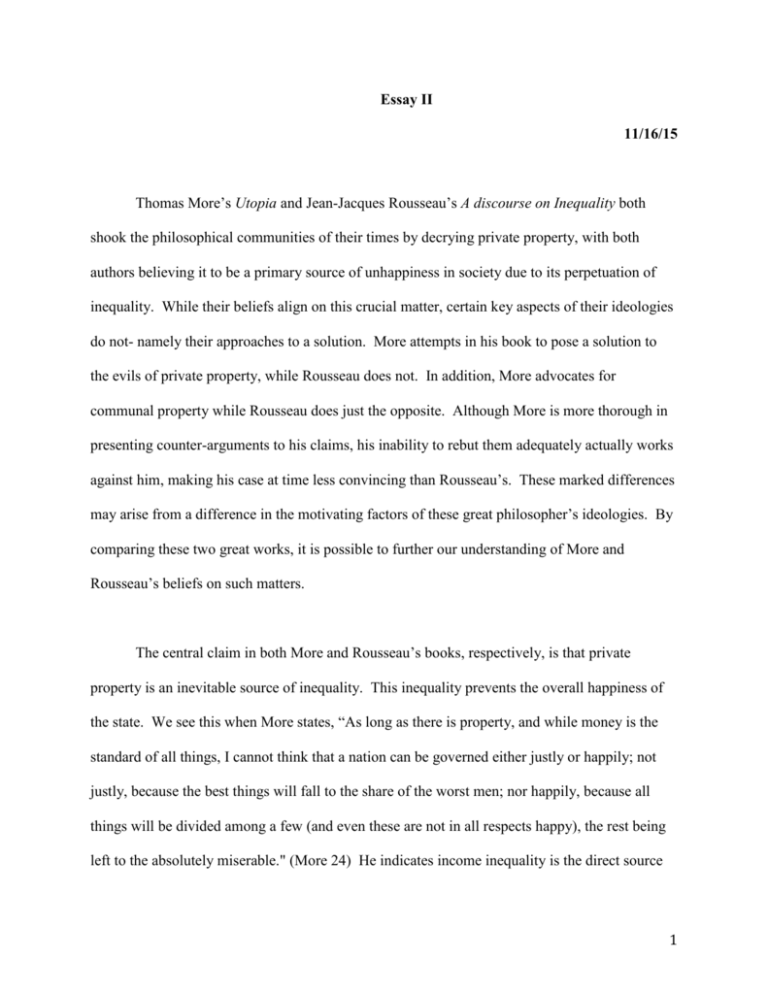
Essay II 11/16/15 Thomas More’s Utopia and Jean-Jacques Rousseau’s A discourse on Inequality both shook the philosophical communities of their times by decrying private property, with both authors believing it to be a primary source of unhappiness in society due to its perpetuation of inequality. While their beliefs align on this crucial matter, certain key aspects of their ideologies do not- namely their approaches to a solution. More attempts in his book to pose a solution to the evils of private property, while Rousseau does not. In addition, More advocates for communal property while Rousseau does just the opposite. Although More is more thorough in presenting counter-arguments to his claims, his inability to rebut them adequately actually works against him, making his case at time less convincing than Rousseau’s. These marked differences may arise from a difference in the motivating factors of these great philosopher’s ideologies. By comparing these two great works, it is possible to further our understanding of More and Rousseau’s beliefs on such matters. The central claim in both More and Rousseau’s books, respectively, is that private property is an inevitable source of inequality. This inequality prevents the overall happiness of the state. We see this when More states, “As long as there is property, and while money is the standard of all things, I cannot think that a nation can be governed either justly or happily; not justly, because the best things will fall to the share of the worst men; nor happily, because all things will be divided among a few (and even these are not in all respects happy), the rest being left to the absolutely miserable." (More 24) He indicates income inequality is the direct source 1 of widespread unhappiness. In his Discourse on Inequality, Rousseau argues, “The first person who, having enclosed a plot of land, took it into his head to say this is mine and found people simple enough to believe him, was the true founder of civil society.” He goes on to blame private property for causing some of societies most pressing problems: “What crimes, wars, murders, what miseries and horrors would the human race have been spared, had someone pulled up the stakes or filled in the ditch and cried out to his fellow men: 'Do not listen to this impostor. You are lost if you forget that the fruits of the earth belong to all and the earth to no one!” Rousseau seems to refer to civil society with a distasteful tone, as though spitting out the words. Both More and Rousseau advocate for the abolition of private property, with More saying on page 47, “Thus I am firmly persuaded that there is no way property can be equitably and justifiably distributed or the affairs of mortal men managed so as to make them happy unless private property is utterly abolished.” However, the ways in which the two address a solution is markedly different. More’s Utopia presents a vision of a society that successfully operates with communal property and thus provides a well-developed model of a solution to the social injustices derived from private ownership. Rousseau resolves merely to identify private property as a problem plaguing society, while advocating for a state of man that existed before society but without providing any tangible solutions to the present predicament. “Discontented with your present state, for reasons that herald even greater discontents for your unhappy Posterity, you might perhaps wish to be able to go backward.” (Rousseau, 37) While it is unclear whether More crafts his Utopia with the purpose of actually advocating for a communist society or if he is merely using it as a literary conceit to draw attention to the social problems of the real world, it can be agreed that he 2 advocates for some level of change for the society he lives in. “The one and only path to the welfare of the public is the equal allocation of goods… For where everyone tries to get clear title to whatever he can scrape together, then however abundant things are, a few men divide up everything among themselves, leaving everyone else in poverty.” (More 47) Throughout Inequality, Rousseau never actually proposes a fix for the ills that private property inflicts on modern society. Another key point of conflict between More and Rousseau’s ideologies on property is their views on communal property. More’s Utopia is very open in its support of communal property as a true solution for inequality. In the Utopia that he paints, all inhabitants live communally, sharing homes and resources. He declares this practice to be central to the beliefs of Utopia, stating, “chiefly what seemed the foundation of all the rest, their living in common, without the use of money.” (More, 105) Rousseau in his book seems at first to support the notion of communal property, painting a portrait of families living happily amongst one another. “The first movements of the heart were the effect of this situation, which united in a common dwelling husbands and wives, fathers and children; the habit of living together generated the sweetest sentiments known to man, conjugal love and paternal love. Each family became a little society, all the better united because mutual affection and liberty were its only bonds.” (Rousseau, 112) However, this apparent praise for communal property soon turns to condemnation. Rousseau claims that living this manner dulls the skills and senses of the savage man, making him weak. He argues that men and women seem “to lose something of their ferocity and of their strength.” (Rousseau, 112) He continues by tying in this weakness to a loss of happiness, saying that living communally was “the first source of the evils they prepared for 3 their descendants,” and that “they had also lost through their habitual use their power to please, and as they had at the same time degenerated into actual needs, being deprived of them became much more cruel than the possession of them was sweet; and people were unhappy in losing them without being happy in possessing them.” (Rousseau, 113) Rousseau touches again here on his concept of a sort of happiness of ignorance: that the happiness experienced by civilized man is of a different breed and much harder to obtain due to things he takes for granted. This is something More fails to address when discussing the happiness of Utopians, which would lead one to question whether they, being civilized people, would be able to be happy in a society void of such comforts. Criticisms can be made of Rousseau’s argument as well, though, in that by condemning both private and communal property, the only thing he seems to advocate is a society in which everyone owns nothing and fends for themselves, a situation all but impossible in modern civilization. What’s intriguing about Utopia is that More, a character in the book named after the author, evokes heavy criticism for the revolutionary ideas of Hythloday. The criticisms that More presents to Hylthoday surprisingly carry weight and rip in to the ideology that the book otherwise seems to promote. More points out that a country with communal property will provide no incentive to work, for each person would benefit off the labor of others. He further attests that the citizens of such a society would be prone to conflict due to a lack of authority that communal property would promote. Hythloday’s only response to this is that More does not understand because he hasn’t seen such a society firsthand. Thomas More’s willingness to criticize the views presented in his book suggests either the length to which More had to go to 4 separate himself from his dangerous ideas or his own internal conflict of beliefs. While it adds merit to More’s argument that he presents counterarguments to a degree that Rousseau does not, his inability to address these counters acutely and successfully actually damages his argument more than it helps. One possible source of these differences in the two philosophers’ views on property could be the differences in motivations that spurn their beliefs. One aspect of More’s utopian society that often gets overlooked in discussion is its basis in Christianity. The oft-ignored Book I of Utopia is heavily infused with allusions to Christianity and critiques of More’s real-world society in which the basis of Christian faith has been corrupted. Thus, when he creates his imaginary utopia, he does so with the purpose of creating something more than just a communal society; he creates a purely Christian society. Thus it would be fair to assume that his support of common property spurns somewhat from the teachings of Jesus and the communal practices of him and his followers. Rousseau touches on religion in Part Two of Discourse, but he seems to have a love-hate relationship with the concept and it is clear that his ideas on property are not derived from religion as More’s are. Rousseau’s distaste for private property seems to come from a general disillusionment with present day capitalist society and his views are bound more by dry logic than the ideals of religious teaching. This distinction could be the basis for More and Rousseau’s conflicting beliefs about happiness. It has been established that both authors agree that private property causes men to take advantage of one another, which leads to unhappiness of the oppressed masses. The rich, Hythloday says, “have grown dissatisfied with the income that their predecessors got out of their 5 estates. They're no longer content to lead lazy, comfortable lives, which do no good to society – they must actively do it harm, by enclosing all the land they can for pasture, and leaving none for cultivation.” (More, 83) Rousseau mirrors this sentiment when his states that out of property rose domination and servitude- or violence and theft. (118) More’s interpretation seems to suggest that the rich man is happy at the expense of the poor masses, but Rousseau’s logical analysis goes further, suggesting that even the rich civilized man cannot be happy due to his reliance on the comforts that civilization provides. “Savage man and civilized man differ so much in their inmost heart and inclinations that what constitutes the supreme happiness.” (Rousseau, 68) This belief could be the root of Rousseau’s inability to pose a solution to private property, because he believes civilized man is already incapable of the simple satisfactions of savage man. By contrast, More’s religious beliefs lead him to believe that happiness in communal society is possible due to reverence of god and the happiness gained from his teachings. Although More and Rousseau’s ideas conflict in some areas, they both unequivocally arrive at the conclusion that the possession of private property is plaguing modern society. Their points of conflict should be viewed not in opposition but as two great philosophers bringing their individual skills to what they have deemed to be an age old problem. While More is able to tactfully craft a replicable solution in his imaginary Utopia, Rousseau is adept at digging at the root of property and its prehistoric ties to inequality. More brought his religious background and Rousseau brought his mastery of logic to crusade for the most noble cause in philosophy, the dream of a happy society. 6 Word count: 1930 Rousseau, Jean-Jacques, Roger D. Masters, Christopher Kelly, Jean-Jacques Rousseau, and JeanJacques Rousseau. 1992. Discourse on the origins of inequality (second discourse) ; Polemics ; and, Political economy. Hanover, NH: Published for Dartmouth College by University Press of New England. More, Sir Thomas.Utopia. Vol. XXXVI, Part 3. The Harvard Classics. New York: P.F. Collier & Son, 1909–14; Bartleby.com, 2001. “I pledge that I have neither received nor given any unauthorized assistance during the completion of this work. James David Steen.” 7


